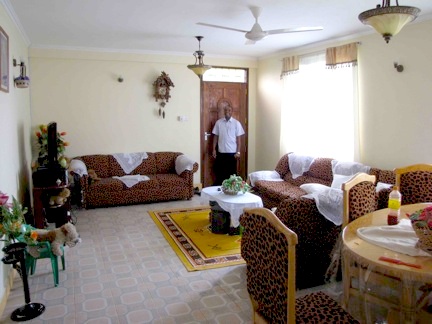Have you ever done an inventory of your personal possessions? Maybe for insurance or estate purposes you sat down and determined the approximate value of all the things you own. For most Americans it is a staggering list: vehicles, furniture, electronics, kitchenware, clothing, linens, and the other assorted pieces of junk that populate our lives. We fill up our homes, our closets, our attics and garages and then we have to go and rent storage spaces to hold all the overflow things. Do you have an idea of the dollar value or replacement value of all these things? With that dollar figure in mind let me tell you a story about a tragic event that happened in the Kibera slum of Nairobi Kenya last month. Late on a Sunday evening a tragic fire swept through that neighborhood. The very nature of this community makes it a fireman’s worst nightmare. The stick and mud homes are literally attached to one another; there are no streets, little running water, mounds of trash and combustible materials. On that particular night the fire raged and they could not get it under control until hundreds of homes were destroyed and thousands of people displaced. New Hope Initiative is directly connected to at least 100 people that were affected. These are members of our church, students at our school, and leaders in Project Biashara. We asked Pastor Simon what we could do to help those that were affected by the fire and he told us that 20,000 shillings or about $200 could replace most of the things these families lost. Let that number sink in for a moment, $200 would replace every single thing these families owned! All the furniture, housewares, clothes, linens, every worldly possession for the entire family could be replaced by an amount of money that most of us would think of as pretty insignificant.
My point is not to try and motivate you to give to help these victims, we have had churches and individuals who have already stepped up and we are in the process of helping these families recover. My purpose in this story is to motivate us to look at our closets, attics, garages, and storage sheds and to determine how many things we really need in order to enjoy our lives. Please don't misunderstand me, I am not trying to make you feel guilty, we should enjoy the blessings of God and be thankful for the incredible privilege of living as a 21st Century American. However what I am trying to get us to consider is this, can we live with less so that others can have more. Could we reduce the amount of clutter in our lives so that others could enjoy some of the basic necessities? Could simpler lives actually lead to a greater personal fulfillment? If you lost everything in a tragic fire how much of it would really have meaning to you?
By Sandy Baird - Director of New Hope Initiative


 The Sierra Leone Project is moving forward all in God’s timing. Praise the Lord! Although some of the children recently contracted chicken pox, they are all happy and excited with the positive changes in their lives. The introduction of sewing machines and Garcia tie dying should assist in developing new skills. The children just completed their inter-house sports meet with the blue team coming out on top.
Between school and sports the children help by doing chores around the orphanage including laundry, cleaning, cooking, and dishes. Everyone also pitched in and cleared two acres of land for the planting of cassava (a staple in their diet). The children are eager to help with projects that will improve their diet. A small pig farm is high on the prayer list at the home.
The Sierra Leone Project is moving forward all in God’s timing. Praise the Lord! Although some of the children recently contracted chicken pox, they are all happy and excited with the positive changes in their lives. The introduction of sewing machines and Garcia tie dying should assist in developing new skills. The children just completed their inter-house sports meet with the blue team coming out on top.
Between school and sports the children help by doing chores around the orphanage including laundry, cleaning, cooking, and dishes. Everyone also pitched in and cleared two acres of land for the planting of cassava (a staple in their diet). The children are eager to help with projects that will improve their diet. A small pig farm is high on the prayer list at the home.


